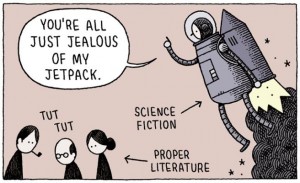 There’s a piece of advice I see tossed at authors a lot lately. Don’t worry about genre or tropes. Write what’s in your heart.
There’s a piece of advice I see tossed at authors a lot lately. Don’t worry about genre or tropes. Write what’s in your heart.
Okay, setting aside the somewhat treacle-y nature of this advice, I’d never tell an author to discard their writing passions. If you’re not writing from your core, your passions, the whole thing becomes a cold, unhappy business. But throwing out genre? That’s a different kettle of Antarian singing blood eels.
Sure. It would be lovely to say go nuts, write whatever! Writers should be free! Free, I say! Which is great, in theory. Thing is, writing for publication is not a solitary endeavor. It’s a social and commercial contract between the writer and the reader. You, as the writer, have responsibilities. Your reader, especially a genre reader, has expectations.
Let’s take a look at science fiction, just as an example. We can talk about SF tropes until the ISS loses orbit, SF is full of them. Tropes are part of those reader expectations and those already established understandings. (Every genre has tropes. Every piece of literature has tropes. We have 10,000 years behind us as human storytellers. Everyone writes tropes. There’s a significant difference between trope and cliche.) In SF, we’ve come to rely on certain shorthand items. That’s part of the rules, along with trying to write extrapolating from the laws of the universe as we currently know them. But if you toss out the rules? Rely too much on pseudo-science and magic? You begin to break the contract with your readers. This wasn’t what they signed up for. It wasn’t the genre they were expecting. We see these elements freely in superhero stories…
And look at that. We’ve just wandered into another genre.
Am I saying don’t break the rules? Nah. I’m a reclusive little rebel, but still a rebel at heart. Bend them. Break them. Shatter them. But make sure you understand the genre before you do it. Understand why you’re doing it. Understand that you may be asking the reader for a new contract, and they may not be willing to sign.


